- Home
- Connie Willis
Blackout Page 2
Blackout Read online
Page 2
“I don’t know where you got this ridiculous idea, Colin. No one is going to St. Paul’s to rescue anything.”
“Then why are you going to St. Paul’s?”
“That doesn’t concern you—what is that?” he said as the tech came in carrying a knee-length yellow satin coat embroidered with pink flowers.
“This?” she said. “Oh, it’s not for you. It’s for Kevin Boyle. He’s doing King Charles II’s court. There’s a telephone call from Research for you. Shall I tell them you’re busy?”
“No, I’ll take it.” He followed her into the workroom.
“Nothing on Paternoster Row? What about Ave Maria Lane? Or Amen Corner?” Colin heard him say, followed by a long pause, and then, “What about the casualties lists? Were you able to find one for the seventeenth? No, that’s what I was afraid of. Yes, well, let me know as soon as you do.” He came back out.
“Was that phone call about why you’re going to St. Paul’s?” Colin said. “Because if you need to find out something, I could go back to St. Paul’s and—”
“You are not going to St. Paul’s or World War II or the World Trade Center. You are going back to school. After you’ve passed your A-levels and been admitted to Oxford and the history program, then we’ll discuss your going to—”
“By then, it’ll be too late,” Colin muttered.
“Too late?” Mr. Dunworthy said sharply. “What do you mean?”
“Nothing. I’m ready to go on assignment now, that’s all.”
“Then why did you say ‘By then, it will be too late’?”
“Just that three years is ages, and by the time you let me go on assignment, all the best events will have been taken, and there won’t be anything exciting left.”
“Like the evacuated children,” Mr. Dunworthy said. “Or the Phoney War. And that’s why you cut class and came all the way up here to convince me to let you go on assignment now, because you were afraid someone else might take the Phoney—”
“What about this?” the tech said, coming in with a belted tweed shooting jacket and knee-length knickerbockers.
“What is that supposed to be?” Mr. Dunworthy roared.
“A tweed jacket,” she said innocently. “You said—”
“I said I wanted to blend in—”
“I must get back to school,” Colin said, and made his escape.
He shouldn’t have said that about it being too late. Once Mr. Dunworthy got hold of something, he was like a dog with a bone. He shouldn’t have mentioned Polly either. If he finds out why I want to go on assignment, he won’t even consider it, Colin thought, heading toward the Broad.
Not that he was considering it now. Colin would have to think of some other argument to convince him. Or, failing that, some other way to get to the past. Perhaps if he could find out why Mr. Dunworthy was going to St. Paul’s, he could convince him he needed to take him along. The tech had said something about the jacket’s being from 1950. Why would Mr. Dunworthy go to St. Paul’s in 1950?
Linna would know. He turned down Catte Street and ran down to the lab but it was locked.
They can’t have closed, he thought. They said they had two drops and three retrievals to do. He knocked.
Linna opened the door a crack, looking distressed. “I’m sorry. You can’t come in,” she said.
“Why? Has something gone wrong? Nothing’s happened to Polly, has it?”
“Polly?” she said, looking surprised. “No, of course not.”
“Has something gone wrong with one of your retrievals?”
“No… Colin, I’m not supposed to be talking to you.”
“I know you’re busy, but I only need to ask you a few questions. Let me in and—”
“I can’t,” she said and looked even more distressed. “You’re not allowed in the lab.”
“Not allowed? Did Badri—?”
“No. Mr. Dunworthy rang us. He said we aren’t to allow you anywhere near the net.”
I said to the man who stood at the Gate of the Year, “Give me a light that I may tread safely into the unknown.” And he replied, “Go out into the darkness, and put your hand into the Hand of God. That shall be to you better than light and safer than a known way.”
—KING GEORGE VI, CHRISTMAS SPEECH, 1939
Warwickshire—December 1939
WHEN EILEEN REACHED THE STATION IN BACKBURY, THE train wasn’t there. Oh, don’t let it have gone already, Eileen thought, leaning over the edge of the platform to look down the tracks, but there was no sign of it in either direction.
“Where is it?” Theodore asked. “I want to go home.”
I know you do, Eileen thought, turning to look at the little boy. You’ve told me so every fifteen seconds since I arrived at the manor. “The train’s not here yet.”
“When will it come?” Theodore asked.
“I don’t know. Let’s go ask the stationmaster. He’ll know.” She picked up Theodore’s small pasteboard suitcase and gas-mask box and took his hand, and they walked down the platform to the tiny office where freight and luggage were stowed. “Mr. Tooley!” Eileen called, and knocked on the door.
No answer. She knocked again. “Mr. Tooley!”
She heard a grunt and then a shuffle, and Mr. Tooley opened the door, blinking as though he’d been asleep, which was very likely the case. “What’s all this, then?” the old man growled.
“I want to go home,” Theodore said.
“The afternoon train to London hasn’t already gone, has it?” Eileen asked.
Mr. Tooley squinted at her. “You’re one of the maids up to the manor, an’t ye?” He looked down at Theodore. “This one of her ladyship’s evacuees?”
“Yes, his mother sent for him. He’s to take the train to London today. We haven’t missed it, have we?”
“Sent for him, has she? I’ll wager she said she missed her precious boy. Wants his ration book, more likely. Couldn’t even be bothered to come get him herself.”
“She works in an aircraft factory,” Eileen said defensively. “She couldn’t arrange time off from work.”
“Oh, they can manage it, all right, when they want to. Had two of ’em come in Wednesday on their way to Fitcham. ‘Taking our babies home so we can all be together for Christmas,’ they said. So they could sample the drink at Fitcham’s pub, is more like it. And done a bit of drinking on the way up—”
You’re a fine one to talk, Eileen thought. She could smell the alcohol on his breath from where she stood. “Mr. Tooley,” she said, trying to get him back to the matter at hand, “when is the afternoon train for London due?”
“There’s only the one at 11:19. They discontinued the other last week. The war, you know.”
Oh, no, that meant they’d missed it, and she’d have to take Theodore all the way back to the manor.
“But it hasn’t been through yet, and no tellin’ when it will be. It’s all these troop trains. They push the passenger trains onto a siding till they’ve gone past.”
“I want—” Theodore began.
“Bad as their mothers,” Mr. Tooley said, glaring at him. “No manners. And her ladyship working her fingers to the bone caring for the ungrateful tykes.”
Making her servants work their fingers to the bone, you mean. Eileen only knew of two times Lady Caroline had had anything at all to do with the twenty-two children at the manor: once when they’d arrived—according to Mrs. Bascombe, she’d wanted to ensure that she only got “nice” ones, and had done so by going to the vicarage and choosing them herself like melons—and once when a reporter for the Daily Herald had come to do a piece on the “wartime sacrifices of the nobility.” The rest of the time she confined her care to issuing orders to her servants and complaining about the children making too much noise, using too much hot water, and scuffing up her polished floors.
“It’s wonderful the way her ladyship pitches in and does her bit for the war effort,” Mr. Tooley said. “I know some in her place wouldn’t take in a stray kitten,
let alone give a lot of slum brats a home.”
He shouldn’t have said the word “home.” Theodore immediately began tugging on Eileen’s coat. “How late do you think the train will be today, Mr. Tooley?” she asked.
“No telling. Might be hours.”
Hours, and the afternoon was already drawing in. This time of year it began to grow dark by three and was pitch black by five. With the blackout…
“I don’t want to wait hours,” Theodore said. “I want to go home now.”
Mr. Tooley snorted. “Don’t know when they’re well off. Now Christmas is coming, they’ll all want to go home.” Eileen hoped not. Evacuees had begun to trickle back to London as the months of the Phoney War went by, and by the time the Blitz began, 75 percent had been back in London, but she hadn’t thought it would happen so soon.
“You want to go home now, but when the bombing starts, you’ll wish you were back here.” Mr. Tooley shook his finger at Theodore. “But it’ll be too late then.” He stomped back to his office and slammed the door, but none of it had any effect on Theodore.
“I want to go home,” he repeated stolidly.
“The train will be here soon,” Eileen assured him.
“I’ll wager it won’t,” a little boy’s voice said. “It—” and was cut off by a fierce “Shh.”
Eileen turned, but there was no one on the platform. She walked quickly over to the edge and looked down at the tracks. There was no one there either. “Binnie! Alf!” she called. “Come out from under there immediately,” and Binnie crawled out from underneath the platform, followed by her little brother, Alf. “Come up off those tracks. It’s dangerous. The train might come.”
“No, it won’t,” Alf said, balancing on a rail.
“You don’t know that. Come up here immediately.”
The two children climbed up onto the platform. They were both filthy. Alf’s usual runny nose had produced a dirty smear, and his shirt was half out of his trousers. Eleven-year-old Binnie looked just as draggled, her stockings bunched, her hair ribbon untied and the ends hanging down. “Wipe your nose, Alf,” Eileen said. “What are you doing here? Why aren’t you two in school?”
Alf wiped his nose on his sleeve and pointed at Theodore. “’E’s not in school.”
“That’s beside the point. What are you doing here?”
“We seen you goin’ by,” Binnie said.
Alf nodded. “We thought you was leavin’.”
“I didn’t,” Binnie said. “I thought she was going off to meet somebody. Like Una done.” She smiled slyly at Eileen.
“You ain’t leavin’, are you?” Alf asked, looking at Theodore’s suitcase. “We don’t want you to. You’re the only one wot’s nice to us, you are. Mrs. Bascombe and Una ain’t.”
“Una sneaks off to meet a soldier,” Binnie said. “In the woods.”
Alf nodded. “We followed ’er on ’er half-day out.”
Binnie shot him such a deadly look that Eileen wondered if they’d been following her on her half-day as well. She’d have to make certain they were in school next week. If that were possible. The vicar, Mr. Goode—a serious young man—had already been to the manor twice to discuss their repeated truancies. “They seem to be having difficulty adapting to life here,” he’d said.
Eileen thought they’d adapted all too well. Within two days of their having been chosen by Lady Caroline (she had clearly failed to recognize the “nice” ones in their case), they’d mastered apple stealing, bull teasing, vegetable garden trampling, and leaving open every gate in a ten-mile radius. “It’s too bad this evacuation scheme doesn’t work both ways,” Mrs. Bascombe had said. “I’d evacuate them back to London with a luggage label round their necks in a minute. Little hooligans.”
“Mrs. Bascombe says nice girls don’t meet men in the woods,” Binnie was saying.
“Yes, well, nice girls don’t spy on people either,” Eileen said. “And they don’t skip school.”
“Teacher sent us ’ome,” Binnie said. “Alf took ill. ’Is ’ead’s dreadful hot.”
Alf attempted to look ill. “You ain’t leavin’, are you, Eileen?” he asked plaintively.
“No,” she said. Unfortunately. “Theodore is.”
Mistake. Theodore immediately piped up, “I want—”
“You will,” she said, “as soon as the train comes.”
“It ain’t comin’,” Alf said. “Anyway, yestiddy it didn’t.”
“How do you know?” Eileen demanded, but she already knew the answer: They’d skipped school yesterday, too. She marched over to the office and hammered on the door. “Is it true the passenger train sometimes doesn’t come at all?” she said as soon as Mr. Tooley opened the door.
“It—what are you two doin’ here? If I catch you Hodbins again—” He raised his fist threateningly, but Binnie and Alf had already darted down the platform, jumped off the end, and disappeared. “You tell them two to stop throwing rocks at the train, or I’ll have ’em up on charges,” he shouted, his face red. “Criminals! They’ll end up in Wandsworth.”
Eileen was inclined to agree with him, but she couldn’t let herself be sidetracked. “Is it true the train didn’t come at all yesterday?”
He nodded reluctantly. “Trouble on the line, but they’ll likely have fixed it by now.”
“But you don’t know for certain?”
“No. You tell them two I’ll set the constable on ’em if they come round here again.” He stomped back into the office.
Oh, dear. They couldn’t stay here all night, not knowing whether the train would come or not. Theodore’s face was already pinched with cold, and with the blackout, station lights weren’t allowed. If the train came after dark, it might not even see them waiting and wouldn’t stop. She’d have to take him all the way back to the manor and try again tomorrow. But his ticket was for today, and she had no way to get in touch with his mother and tell her he wasn’t coming. She peered anxiously down the track, looking for a glimpse of smoke above the bare trees.
“I’ll wager the line was out ’cause there was a train wreck,” Binnie said, appearing from behind a pile of sleepers.
“I’ll wager a jerry plane flew over and dropped a bomb and the whole train blew up,” Alf said. They clambered up onto the platform. “Boom! Arms and legs everywhere! And ’eads!”
“That’s enough of that,” Eileen said. “You two go back to school.”
“We can’t,” Binnie protested. “I told you, Alf’s got a fever. His ’ead’s—”
Eileen clapped her hand to Alf’s perfectly cool forehead. “He hasn’t any fever. Now go.”
“We can’t,” Alf said. “School’s let out.”
“Then go home.”
At the word, Theodore’s face puckered up. “Here, let’s put your mittens on,” Eileen said hastily, kneeling in front of him. “Did you ride on a train when you came to Backbury, Theodore?” she asked to distract him.
“We come on a bus,” Binnie said. “Alf was sick all over the driver’s shoes.”
“You get your ’ead cut off on a train if you stick it out the window,” Alf said.
“Come along, Theodore,” Eileen said. “Let’s go stand out by the edge where we can see the train coming.”
“A girl I know stood too close to the edge and fell onto the tracks,” Binnie said, “and a train run right over her. Sliced her right in ’alf.”
“Alf, Binnie, I don’t want to hear another word about trains,” Eileen said.
“Not even if it’s comin’?” Binnie said and pointed down the tracks. The train was indeed bearing down on them, its massive engine wreathed in steam.
Thank goodness. “Here’s your train, Theodore,” Eileen said, kneeling to button his coat. She hung his gas-mask box around his neck. “Your name and address and destination are on this paper.” She tucked it in his pocket. “When you get to Euston, don’t leave the platform. Your mother will come out to the train to fetch you.”
“What if she ain’t t
here?” Binnie asked.
“What if she got killed on the way?” Alf said.
Binnie nodded. “Right. What if a bomb blew ’er up?”
“Don’t listen to them,” Eileen said, thinking, Why can’t it be the Hodbins I’m sending home? “They’re teasing you, Theodore. There aren’t any bombs in London.” Yet.
“Why’d they send us ’ere then?” Alf said, “’Cept to get us away from the bombs?” He stuck his face in Theodore’s. “If you go ’ome, a bomb’ll prob’ly get you.”
“Or mustard gas,” Binnie said, clutching her throat and pretending to choke.
Theodore looked up at Eileen. “I want to go home.”
“I don’t blame you,” Eileen said. She picked up his suitcase and walked him over to the slowing train. It was full of soldiers. They peered around the blackout curtains in the compartments, waving and grinning, and jammed the platforms at both ends of the cars, some of them half hanging out over the steps. “Come to see us off to the war, ducks?” one of them called to Eileen as the car slowed to a whooshing halt in front of her. “Come to kiss us goodbye?”
Oh, dear, I hope this isn’t a troop train. “Is this the passenger train to London?” she asked hopefully.
“It is,” the soldier said. “Hop aboard, luv.” He leaned down, one hand extended, the other clutching the side railing.
“We’ll take good care of you,” a beefy, red-faced soldier next to him said. “Won’t we, boys?” and there was an answering chorus of hoots and whistles.
“I’m not taking the train. This little boy is,” she said to the first soldier. “I need to speak to the guard. Can you fetch him for me?”
“Through that mob?” he said, looking back into the car. “Nothing could get through that.”
Oh, dear. “This little boy must get to London,” she said. “Can you see that he arrives there safely? His mother will be at the station to meet him.”
He nodded. “Are you certain you don’t want to come as well, luv?”

 Passage
Passage Bellwether
Bellwether Blackout
Blackout Doomsday Book
Doomsday Book A Lot Like Christmas: Stories
A Lot Like Christmas: Stories Water Witch
Water Witch To Say Nothing of the Dog
To Say Nothing of the Dog Fire Watch
Fire Watch The Winds of Marble Arch and Other Stories
The Winds of Marble Arch and Other Stories Uncharted Territory
Uncharted Territory All Clear
All Clear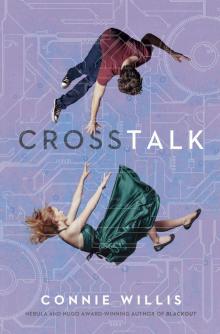 Crosstalk
Crosstalk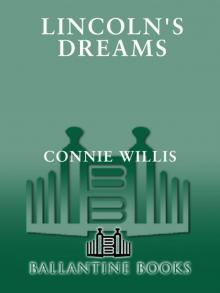 Lincoln's Dreams
Lincoln's Dreams Miracle and Other Christmas Stories
Miracle and Other Christmas Stories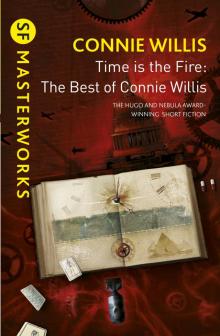 Time is the Fire
Time is the Fire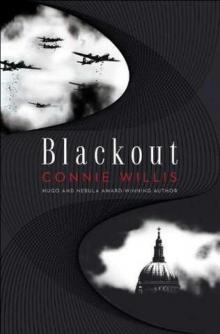 Blackout ac-1
Blackout ac-1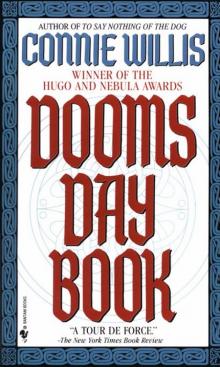 Dooms Day Book
Dooms Day Book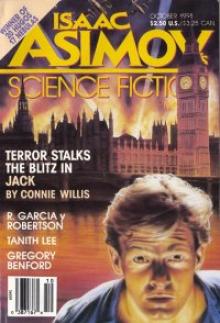 Jack
Jack The Doomsday Book
The Doomsday Book Terra Incognita
Terra Incognita The Best of Connie Willis
The Best of Connie Willis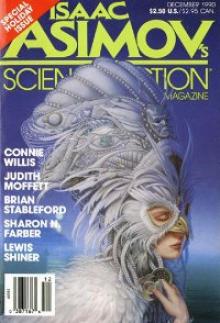 Cibola
Cibola Schwarzschild Radius
Schwarzschild Radius Even the Queen
Even the Queen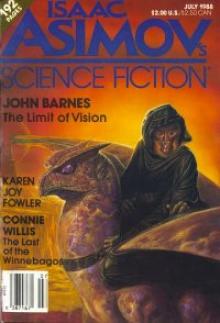 The Last of the Winnebagos
The Last of the Winnebagos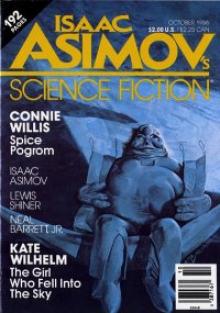 Spice Pogrom
Spice Pogrom Oxford Time Travel 1 - Blackout
Oxford Time Travel 1 - Blackout At The Rialto
At The Rialto A Lot Like Christmas
A Lot Like Christmas